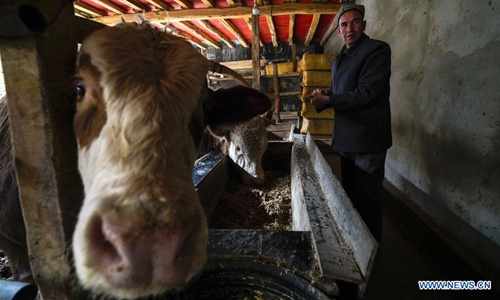US-backed World Uygur Congress, spokesperson for terrorism

A man feeds the cattle at the breeding part of his house at a village of Buzak Township in Hotan County, northwest China's Xinjiang Uygur Autonomous Region, Nov. 24, 2019. A series of housing projects in 22 impoverished counties in southern Xinjiang Uygur Autonomous Region have benefited around 396,100 households since 2018, not only providing better homes for those who once lived in shabby residences but also boosting their source of livelihood. Measures including "toilet revolution" and flower planting have been carried out in these poverty-stricken villages. Based on the successful experience in the south of Xinjiang, local authorities have pushed forward the building of "beautiful courtyard" project in all villages of Xinjiang in a bid to improve locals' living standards since 2019. Photo:Xinhua
The US House of Representatives on Tuesday local time passed the so-called "Uyghur Human Rights Policy Act of 2019," which has grossly interfered in China's internal affairs and slandered China's efforts in deradicalization and counter-terrorism in Xinjiang.
The United States, as a matter of fact, has also colluded with terrorist and separatist forces including the World Uygur Congress (WUC).
In recent years, anti-China forces in the United States have been acting as hidden sponsors of the terrorist forces of "East Turkistan." The US National Endowment for Democracy (NED) has increased its donation to the "East Turkistan" organizations, such as the WUC, with a rise in donations from 556,000 US dollars in 2017 to 960,000 US dollars in 2019.
Some high-level US officials publicly expressed support for the "East Turkistan" separatist activities. In June 2019, US House Speaker Nancy Pelosi and chairperson of the NED awarded Dolqun Isa, head of the WUC, for his so-called "contribution to democracy." In addition, a number of US officials have attended meetings with "East Turkistan" separatists and advocated interference in Xinjiang affairs.
Dolqun Isa, on the list of the first batch of wanted terrorists announced by the Chinese government in 2003, became the WUC president in 2017. Ever since then, the WUC has increased its connections with "East Turkistan" extremist organizations, such as the "Eastern Turkistan Islamic Movement" (ETIM) and the "Eastern Turkistan Education and Solidarity Association" (ETESA).
In 2018, Seyit Tumturk, former WUC vice president, recorded a terrorist video, together with 400 armed and military-uniform-clad personnel of the "East Turkistan," threatening to launch terrorist attacks in China.
Two meetings were jointly held by the WUC and the ETESA outside China in February and May 2017 calling for building military forces.
In March 2019, an audio recording released by Rebiya Kadeer, former head of the WUC, revealed the connection between the ETESA and the ETIM. In the meantime, it also unveiled facts that they had sent "jihadists" to Syria.
The WUC removed from its charter the content of rejecting and condemning terrorist activities in violation of international law in 2012, revealing its true color of terrorism.
Founded on the basis of the "East Turkistan National Congress" and the "World Uyghur Youth Congress," which is among the first batch of "East Turkistan" terrorist organizations named by the Chinese government, the WUC has had genes of terrorism since its founding, according to Li Wei, a researcher with the China Institutes of Contemporary International Relations.
The WUC has used religious and ethnic issues as disguise to cover up its terrorist activities, and misled international opinions, Li said.
The WUC is a spokesperson for terrorism, and the US is assisting the evil doer by giving it support, he said.